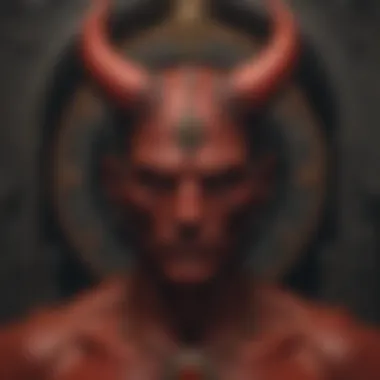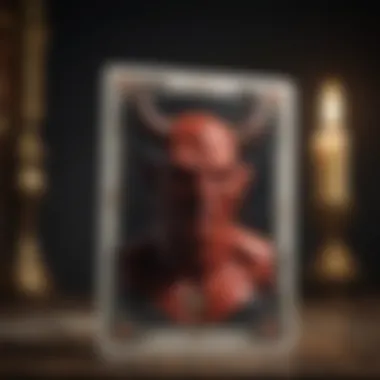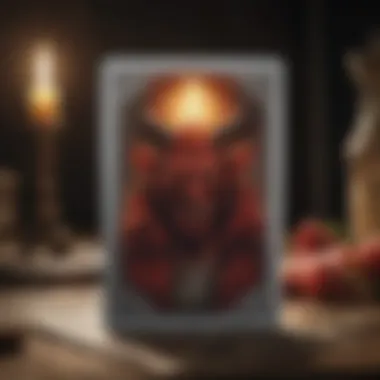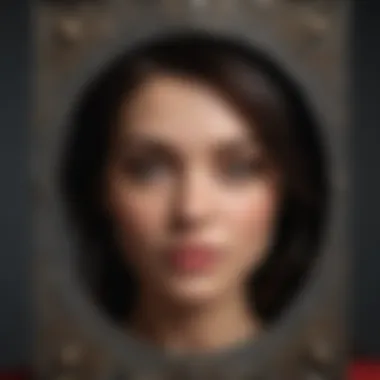Understanding the Devil Tarot Card: A Comprehensive Examination


Intro
The Devil tarot card embodies complex narratives that provoke thought and introspection. Its significance in tarot readings goes beyond mere surface interpretations. Often misunderstood, it represents themes of temptation, bondage, and ultimately, liberation. This card invites those who engage with it to confront aspects of their lives they may prefer to avoid.
As we navigate through its core symbolism, we can uncover how the card interacts with personal growth. Understanding its influence in both upright and reversed positions offers profound insights. Through this lens, the Devil card serves as a mirror, reflecting desires, fears, and aspirations. This article aims to unpack these layers, allowing readers to explore their own life paths while engaging with this intriguing symbol.
Zodiac Profiles
The connection between the Devil tarot card and zodiac signs enriches our understanding of its implications. Each sign resonates differently with the themes of temptation and personal strength often depicted by the card.
Overview of Each Sign
Each zodiac sign brings unique energy to the interpretation of the Devil card. The deep-rooted influences they embody affect how one might perceive the struggles and challenges that arise when the Devil appears in readings.
Personality Traits
Through personality traits, one can see how various signs respond to the suggestions of temptation or bondage.
- Aries: Courageous but may act impulsively.
- Taurus: Stubbornness can lead to material attachments.
- Gemini: Duality creates inner conflict.
- Cancer: Emotionally driven, may resist facing fears.
- Leo: Eager for recognition, could lurch towards vanity.
- Virgo: Prone to overthinking, may fear failure.
- Libra: Struggles with indecision, possibly from desire to please.
- Scorpio: Intense ties to transformation and control.
- Sagittarius: Freedom-seeking can clash with responsibility.
- Capricorn: Ambition might result in feelings of entrapment.
- Aquarius: Values independence, yet may feel societal pressure.
- Pisces: Creativity often faces escapism and illusion.
Strengths and Weaknesses
Recognizing strengths and weaknesses helps in understanding how to approach the challenges presented by the Devil card.
- Strengths: Resilience, adaptability, and self-awareness.
- Weaknesses: Overindulgence, escapism, and fear of confrontation.
Understanding these elements is vital, as they inform how individuals engage with the Devil’s themes.
The Devil card isn't solely about negativity; it reveals the potential for growth and self-liberation.
Furthermore, the Devil card interacts with these signs in profound ways, linking personal experiences to a broader narrative of challenge and victory within one's life.
Compatibility Insights
In the realm of relationships, the Devil card highlights not just personal struggles but also how one's traits mesh with others, particularly in romantic or teamwork contexts.
Love and Relationships
In love, the Devil card often leads us to examine power dynamics and dependencies. It can signify an intense attraction paired with fears of entrapment or unhealthy connections.
Friendship Compatibility
Friendships may become influenced by the themes of the Devil card as well. Recognizing the balance between support and control is essential.
Workplace Dynamics
In a professional environment, this card can guide individuals in recognizing toxic relationships or unhealthy work dynamics, facilitating change and personal accountability.
Astrological Events
Astrological shifts provide context for the energy surrounding the Devil card, creating unique opportunities for introspection and change. Understanding when these events occur can guide personal explorations.
Monthly/Weekly Horoscope Breakdown
Each month often presents specific challenges or opportunities influenced by the Devil's themes in conjunction with prevailing astrological energies.
Notable Celestial Events
Significant celestial occurrences, like eclipses or retrogrades, can amplify the card's messages, driving individuals to confront their personal shadows.
How to Prepare for Astrological Shifts
Preparation involves self-reflection and honesty about where one feels trapped or limited. Using the Devil card as a guide can facilitate this process and help release any inhibiting patterns.


Prologue to the Devil Tarot Card
The Devil tarot card holds a significant place among the cards in a tarot deck. Its representation often elicits strong reactions due to its name and imagery. However, understanding this card is crucial for anyone seeking to deepen their tarot knowledge. It offers insights into personal challenges, temptations, and the dual nature of freedom and bondage.
Historical Background of the Tarot
Tarot has a rich history that dates back to the 15th century. Initially, tarot cards were used for playing games rather than divination. The shift towards tarot being a tool for spiritual insight emerged much later, notably in France during the 18th century. Each card began to acquire meaning beyond mere entertainment. The Devil card, in particular, reflects cultural anxieties about morality and personal power.
The imagery commonly associated with the Devil card can be traced back to earlier decks, such as the Visconti-Sforza tarot from Italy. Interpretations varied considerably, influenced by the historical context and socio-religious temperament of the times. The evolution of the tarot symbolizes ongoing dialogue between humanity's higher aspirations and darker urges. This always keeps the Devil card relevant.
The Role of the Devil in Tarot Decks
The Devil card serves a different role across various tarot decks, depending on the thematic focus of each. In most traditional tarot sets, it portrays a goat-like entity, often symbolizing excess and inhibition. Yet, in alternative decks, this figure can embody transformative energy, prompting the querent to confront their fears.
The card is not solely about negativity; it can represent the struggle between instinct and intellect. This juxtaposition can lead to profound personal revelations. As one engages with the Devil card, it invites exploration of the darker aspects of one's psyche while reminding them that liberation is possible through acknowledgment and understanding. The role of the Devil in tarot readings thus encourages a holistic view of life's complexities, urging seekers to embrace all facets of their existence.
"The Devil card brings forth a confrontation with inauthentic behaviors and fears that hold one back from genuine self-expression."
Symbolism of the Devil Tarot Card
The symbolism of the Devil tarot card holds significance beyond the superficial interpretations often associated with it. Many nearly mistake this card solely for representing evil or negativity. However, a deeper examination reveals layers of meaning that speak to human experience in multiple forms. Understanding the symbolism is crucial for anyone aiming to grasp the broader philosophical and psychological themes in tarot readings, particularly those related to self-limitation, bondage, and liberation.
Visual Elements of the Card
The visual components of the Devil card are intentional and rich with meaning. Generally, the card features a horned figure, often depicted as a goat or a horned humanoid. This figure embodies a dual nature of both power and temptation. The presence of chains, which connect the figure to two smaller beings depicted as naked humans, represents the idea of bondage—both physical and metaphorical. This imagery plays a pivotal role in how one interprets the card in readings.
In addition to the chains, the background often contains dark hues and imagery that convey a sense of entrapment. Conversely, these visual details also serve to remind the observer that liberation is possible. The interplay of light and shadow reinforces the theme of duality; while the image may evoke fear, it also challenges the viewer to confront their limitations and recognize pathways to freedom.
Interpretation of Iconography
The iconography of the Devil card extends beyond its overt visual elements. Each component can be interpreted in numerous ways, allowing for a nuanced understanding during tarot readings. The horned figure represents not just temptation but also the shadow side of human nature—the aspects we repress or deny. The nude figures symbolize a loss of innocence and the potential to be led astray by carnal desires or materialistic pursuits.
Here are several key interpretive angles:
- Bondage and Freedom: The chains can signify self-imposed limitations. They remind us that while we might feel trapped, it is often within our power to break free.
- Materialism: The card could speak to excessive attachment to material possessions. It serves as a caution against allowing the pursuit of wealth to overshadow genuine happiness.
- Desires and Addictions: The card highlights the presence of addictive tendencies. Recognizing these can instigate important changes in one’s life.
Such a rich iconography makes the Devil card a critical focal point in tarot readings. It invites tarot enthusiasts to explore the balance between shadow and light within themselves, urging every individual to transcend limitations and embrace personal growth.
Meaning of the Devil Card in Upright Position
The upright position of the Devil card carries significant weight in tarot readings. It symbolizes a range of themes, primarily centered around chains of materialism, addiction, and fear. Understanding the meanings associated with this card helps provide clarity in various life situations. Specifically, the upright Devil prompts a deeper reflection on one's life choices and desires. It encourages individuals to confront aspects of life that may have become overwhelming or detrimental. Addressing these challenges can lead to important revelations.
Implications of Materialism
In its upright position, the Devil card often highlights the grip of materialism. It serves as a reminder of the distractions and constraints that physical possessions can impose on personal growth. When one becomes focused solely on tangible rewards, it detracts from more meaningful, spiritual pursuits. Materialism may appear appealing at first, yet it can create a false sense of security. The card calls for an evaluation of priorities, prompting individuals to consider what they truly value in life.
- Recognizing Excess: Be mindful of how material accumulation influences daily choices.
- Evaluating Motivations: Ask yourself why certain purchases or aspirations are significant.
- Balancing Values: Strive for harmony between material success and spiritual fulfillment.
Exploring Addiction and Temptation
The Devil card also embodies themes of addiction and temptation. Whether it relates to substances, habits, or unhealthy relationships, this card sheds light on the darker facets of existence. The energy of temptation can be consuming, often leading individuals to feel trapped in unfulfilling cycles. The card invites a confrontation with these challenges.
- Acknowledging Triggers: Identify what leads to these unhealthy behaviors.
- Understanding Consequences: Consider the broader impact of addiction.
- Seeking Help: Recognize when external support is necessary to break free from these chains.
Understanding Fear and Restriction
Another vital aspect of the upright Devil card deals with fear and self-imposed restrictions. This card reveals how fear can manipulate behavior, impeding personal growth. While some fears are valid, many are founded in self-doubt or societal expectations. The card encourages individuals to differentiate between rational and irrational fears.
- Identifying Limiting Beliefs: Examine thoughts that lead to self-sabotage.
- Challenging Negative Narratives: Break down fears by reframing the situation positively.
- Embracing Transformation: Recognize that confronting these fears can lead to liberation and empowerment.
The Devil card urges caution, reflection, and ultimately, the pursuit of freedom from one's of the chains that bind.
In summary, the upright Devil card offers a multifaceted view of one's restrictions. It highlights the importance of acknowledging materialism, confronting addiction, and reframing fear. Each element plays a crucial role in the path to greater self-awareness and holistic growth.


Meaning of the Devil Card in Reversed Position
The reversed position of the Devil card calls attention to a pivotal shift in understanding the messages that may be imparted during a tarot reading. It embodies a significant transformation, indicating the potential to overcome previous limitations and to gain insight into personal realities. The reversed Devil card essentially serves as a guide to explore both external constraints and internal struggles. This aspect heightens the relevance of the reversed card in self-reflection and personal development.
Breaking Free from Bondage
When the Devil card appears reversed, it signals a crucial opportunity to break free from self-imposed limits. Often, individuals may feel trapped in situations that seem insurmountable; this card suggests that liberation is possible. It offers the idea that empowerment can arise from introspection. Achieving freedom from bondage requires recognizing what holds one back; thus, the reversed position highlights the importance of personal agency.
There are several elements to consider when interpreting this aspect:
- Awareness: Acknowledging the factors that contribute to feelings of entrapment is essential. This can be habits, toxic relationships, or societal expectations.
- Choice: The reversed card encourages conscious decision-making, moving towards paths that foster autonomy.
- Courage: Invoking the bravery to confront and alter one's circumstances facilitates change.
Revisiting Personal Values
The reversed Devil card serves as an invitation to reevaluate personal values and what truly matters. It encourages individuals to analyze priorities that may have been influenced by external pressures rather than authentic desires. Often, people may realize that material gains or social acceptance overshadow their intrinsic motivations.
Key considerations for this reflection include:
- Self-Honesty: This requires confronting uncomfortable truths about what one truly values versus what is superficially adopted.
- Alignment: Ensuring actions align more closely with genuine beliefs can lead to a more fulfilling life.
- Intentionality: Practicing mindfulness and intentional decision-making assists in steering life toward clarity of purpose.
Confronting Inner Demons
Finally, the reversed position of the Devil card invites individuals to confront their inner demons. This act of facing discomfort can lead to profound personal transformation. The card highlights that avoidance may contribute to ongoing struggles, and grappling with these shadows is vital for growth.
Thoughts on engaging with inner demons include:
- Identification: Recognizing personal fears, insecurities, and limitations is the first step toward moving past them.
- Acceptance: Accepting these parts of oneself allows for healing and understanding.
- Integration: Learning to integrate lessons from past experiences fosters resilience and wisdom.
“The Devil reversed is a reclaiming of power, a channeling of personal strength towards liberation and authentic living.”
As readers delve into meanings attached to the reversed Devil card, they will find a pathway to introspection and transformation. It invites a deeper connection to oneself, leading to enhanced self-awareness and empowerment.
The Devil Card and Relationships
The Devil tarot card holds a significant place in the realm of personal relationships. It invites introspection and critical examination of connections we foster with others. This section will explore the complexities this card brings to romantic partnerships, highlighting challenges, potential signs of codependency, and possibilities for transformation.
Challenges in Romantic Partnerships
When the Devil card appears in a reading focused on romantic relationships, it may reveal underlying issues that need attention. Common challenges include unhealthy dynamics, where one partner may dominate or control the other. This card often reflects a struggle for power or a sense of entrapment, where individuals feel restricted by their partner’s influence or expectations.
- Communication breakdowns can also emerge. Partners might feel unable to express their true desires, leading to resentment and misunderstandings.
- Jealousy and possessiveness may cloud judgment, creating conflict and tension that disrupt harmony in the relationship.
Understanding these challenges is crucial. Acknowledging them allows partners to address rough patches and strive for more balanced interactions.
Signs of Codependency
The Devil card is often associated with the notion of codependency in relationships. This can manifest as an unhealthy reliance on a partner for emotional support or affirmation, leading to an imbalance where one's identity becomes enmeshed with the other.
Characteristics include:
- Feeling the need to please one’s partner at the expense of personal needs.
- Lack of self-esteem and constant validation-seeking behaviors.
- Difficulty in setting boundaries, often leading to feelings of guilt when asserting oneself.
Identifying these signs is vital for those wishing to cultivate healthier relationships. Underneath, individuals might feel torn between love and the desire for autonomy.
Potential for Transformation
Despite its challenging aspects, the Devil card also offers an opportunity for growth and transformation in relationships. Recognizing patterns of behavior can encourage individuals to navigate complexities more effectively.
Through self-reflection, partners can:
- Confront fears that contribute to toxic dynamics and seek to establish healthier boundaries.
- Engage in honest conversations, which fosters a deeper understanding of each other.
- Work to reclaim their individuality, promoting balance and mutual respect in the partnership.
In essence, while the Devil card in relationships may indicate difficulties, it also signals the potential for liberation. By facing these challenges openly, couples can work toward more authentic connections.


Remember, the journey through understanding each other's needs and addressing deep-seated fears is where true growth occurs.
The Devil Card in Career and Finances
The Devil tarot card provides a rich framework for analyzing our career and financial choices. It emphasizes the tension between your material ambitions and spiritual needs. In a professional context, this card raises critical questions about motivations and consequences. Its presence can point to both the seductive allure of wealth and the potential pitfalls associated with relentless pursuit. Recognizing these themes can empower individuals to make more informed choices about their careers and financial situations.
Material Gain vs.
Spiritual Fulfillment
In the realm of work and finances, the Devil card often juxtaposes material gain with spiritual fulfillment. It invites reflection on whether your job serves more than just financial needs. Many people chase monetary success without considering the impact on their overall well-being. The Devil card can highlight the emptiness that might accompany a high-paying job that lacks passion or purpose.
- It serves as a reminder to evaluate your career path.
- Consider whether your daily work aligns with your core values.
- Are you sacrificing personal happiness for salary?
When material success overshadows spiritual aspirations, it can lead to dissatisfaction and feelings of entrapment.
"Often, the race for success blinds individuals to the spiritual void they may be creating. The Devil card encourages introspection to avoid this trap."
Risk of Burnout and Overcommitment
The Devil card also warns of the risks related to burnout and overcommitment. In career-centric environments, it is easy to fall into patterns of overwork. This not only affects personal health but also productivity in the long run. The card’s appearance might indicate a need for balance.
- Are you taking on too much responsibility at work?
- Is your commitment to success leading to stress and fatigue?
Being aware of these signs is crucial for maintaining mental and physical health. After all, a career should not come at the expense of one's well-being. The Devil card serves as a potent reminder to assess your limits and prioritize self-care in the professional sphere.
Developing Awareness through the Devil Card
The Devil tarot card, often viewed through a lens of fear or misunderstanding, actually opens the door to profound self-awareness and growth. Engaging with this card can highlight our hidden fears and limitations. It serves not just as a warning but as a tool for self-discovery. By applying its teachings, individuals are better able to navigate the complexities of their lives.
Recognizing the themes embodied in the Devil card is essential for astrology enthusiasts. By understanding these themes, one can pinpoint areas of their life that may need attention or change. This embrace of awareness can be incredibly liberating; it encourages a conscious encounter with one's desires, fears, and motivations. The journey through the shadows instills a deeper appreciation for personal potential.
Self-Reflection and Personal Growth
Self-reflection ignites the path to personal growth, especially when navigating the energies of the Devil tarot card. This card often calls attention to the areas in which people feel constrained or limited. It provides an opportunity for introspection about habits and choices that might not serve one’s highest good.
Consider the following benefits of engaging in self-reflection through the lens of the Devil card:
- Recognizing patterns: The card can reveal recurring behaviors that perpetuate negative cycles.
- Identifying personal truths: Reflecting can uncover desires overshadowed by societal expectations or fear.
- Embracing authenticity: Through honest evaluation, individuals can shift away from inauthentic living.
This path of self-reflection may not be comfortable, yet it is necessary. Acknowledging limitations and concerns leads individuals toward a more fulfilling existence.
Identifying Triggers and Patterns
Identifying triggers and patterns is another significant aspect of developing awareness using the Devil card. This card prompts individuals to look at what provokes negative responses in their lives. Such insights are crucial for breaking free from cycles of addiction or dependency, notably in emotional or material aspects.
When confronting triggers, consider:
- Observe emotional responses: Keep a journal to chart moments of agitation, linking them back to specific situations or relationships.
- Evaluate proximity to temptation: Acknowledging environments or individuals that entice unhealthy choices can lead to making more insightful decisions.
- Trace the history: Look back at how certain habits formed and what needs they addressed. Understanding origins allows for crafting healthier coping mechanisms.
Being vigilant about triggers enhances clarity. The Devil card is not simply about bondage; it offers a map guiding individuals toward liberation.
Engaging with the Devil card leads to essential truths that support personal evolution. Awareness beckons transformation into a version of oneself that is more liberated and authentic.
Closure
The examination of the Devil tarot card reveals its significant role in personal growth and understanding the intricacies of human nature. Recognizing the meanings associated with this card allows individuals to confront their deepest fears, desires, and the limitations that bind them. In the context of tarot readings, the Devil card serves as a reminder that liberation is often fraught with challenges, yet it is a necessary path toward self-awareness.
The Path to Liberation
Understanding the implications of the Devil card initiates a journey of self-discovery. It encourages individuals to identify patterns that may hinder their progress. Some key elements of this journey include:
- Acknowledging Fears: Embracing and confronting fear is crucial. This card's presence often signifies that one must face what they avoid in order to find liberation.
- Reevaluating Values: The Devil urges reflection on personal values. Are material possessions dictating priorities? Are relationships healthy? This introspection can lead to transformative change.
- Breaking Free from Dependency: Recognizing unhealthy dependencies is essential. It might manifest in relationships or habits that hinder growth and positivity.
By engaging with the essence of the Devil card, individuals can shift their perspectives. They can learn to transform bondage into a pathway of freedom. The card does not merely symbolize entrapment; rather, it illuminates the road toward personal liberation and the reclamation of one's authentic self.
“True liberation is not merely escaping chains, but also understanding the reasons for those chains.”
Ultimately, the Devil tarot card facilitates a deeper conversation about humanity's struggles and strengths. By understanding its multifaceted meanings, tarot enthusiasts can navigate their life paths with greater clarity. The Devil card is not an end, but a means to profound personal transformation.



